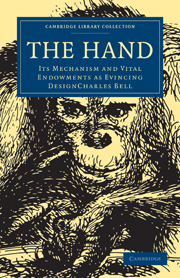Book contents
- Frontmatter
- PREFACE
- Contents
- CHAP. I INTRODUCTORY
- CHAP. II DEFINITION OF THE HAND
- CHAP. III THE COMPARATIVE ANATOMY OF THE HAND
- CHAP. IV OF THE MUSCLES OF THE ARM AND HAND
- CHAP. V THE SUBSTITUTION OF OTHER ORGANS FOR THE HAND
- CHAP. VI THE ARGUMENT PURSUED FROM THE COMPARATIVE ANATOMY
- CHAP. VII OF SENSIBILITY AND TOUCH
- CHAP. VIII OF THE SENSES GENERALLY INTRODUCTORY TO THE SENSE OF TOUCH
- CHAP. IX OF THE MUSCULAR SENSE
- CHAP. X THE HAND NOT THE SOURCE OF INGENUITY OR CONTRIVANCE, NOR CONSEQUENTLY OF MAN'S SUPERIORITY
- ADDITIONAL ILLUSTRATIONS
- APPENDIX
CHAP. X - THE HAND NOT THE SOURCE OF INGENUITY OR CONTRIVANCE, NOR CONSEQUENTLY OF MAN'S SUPERIORITY
Published online by Cambridge University Press: 29 August 2010
- Frontmatter
- PREFACE
- Contents
- CHAP. I INTRODUCTORY
- CHAP. II DEFINITION OF THE HAND
- CHAP. III THE COMPARATIVE ANATOMY OF THE HAND
- CHAP. IV OF THE MUSCLES OF THE ARM AND HAND
- CHAP. V THE SUBSTITUTION OF OTHER ORGANS FOR THE HAND
- CHAP. VI THE ARGUMENT PURSUED FROM THE COMPARATIVE ANATOMY
- CHAP. VII OF SENSIBILITY AND TOUCH
- CHAP. VIII OF THE SENSES GENERALLY INTRODUCTORY TO THE SENSE OF TOUCH
- CHAP. IX OF THE MUSCULAR SENSE
- CHAP. X THE HAND NOT THE SOURCE OF INGENUITY OR CONTRIVANCE, NOR CONSEQUENTLY OF MAN'S SUPERIORITY
- ADDITIONAL ILLUSTRATIONS
- APPENDIX
Summary
Seeing the perfection of the hand, we can hardly be surprised that some philosophers should have entertained the opinion with Anaxagoras, that the superiority of man is owing to his hand. We have seen that the system of bones, muscles, and nerves of this extremity is suited to every form and condition of vertebrated animals; and we must confess that it is in the human hand that we have the consummation of all perfection as an instrument. This, we perceive, consists in its power, which is a combination of strength with variety and extent of motion; we see it in the forms, relations, and sensibility of the fingers and thumb; in the provisions for holding, pulling, spinning, weaving, and constructing; properties which may be found in other animals, but which are combined to form this more perfect instrument.
In these provisions, the instrument corresponds with the superior mental capacities, the hand being capable of executing whatever man's ingenuity suggests. Nevertheless, the possession of the ready instrument is not the cause of the superiority of man, nor is its aptness the measure of his attainments. So, we rather say with Galen—that man had hands given to him because he was the wisest creature, than ascribe his superiority and knowledge to the use of his hands.
This question has arisen from observing the perfect correspondence between the propensities of animals and their forms and outward organization.
- Type
- Chapter
- Information
- The HandIts Mechanism and Vital Endowments as Evincing Design, pp. 208 - 234Publisher: Cambridge University PressPrint publication year: 2009First published in: 1833



